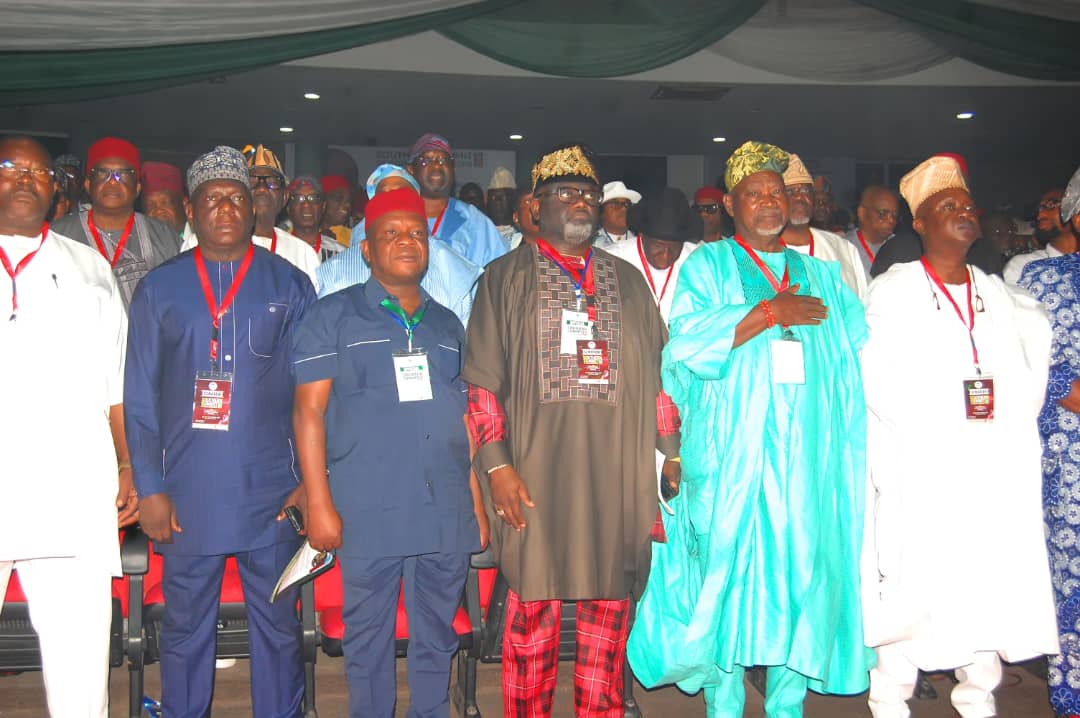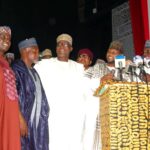FEATURED
2027: Why Nigeria’s Past and Present Lawmakers Say Tinubu’s Continuity Is Non-Negotiable – Reyenieju

….Push for State Police, Power Decentralization, and Fiscal Autonomy
In this exclusive interview, a caucus member of the Southern Nigeria Former Legislators Forum, Honorable Daniel Reyenieju, and South-South Coordinator, National Forum of Former Legislators, share perspectives on Nigeria’s political landscape, governance reforms, and the vital role he believe their forum plays in shaping the nation’s future. With decades of legislative experience, the former lawmaker discuss the significance of unity, the rationale behind endorsing President Bola Ahmed Tinubu for a second term, and the foundational principles guiding their advocacy for fairness and stability across Nigeria’s diverse regions. He shed light on the importance of political conventions like zoning, the long-term benefits of ongoing reforms, and the critical issues Nigeria must address to foster sustainable growth and national cohesion.
- What exactly is the Southern Nigeria Former Legislators Forum and what is its mandate?
The Southern Nigeria Former Legislators Forum is a body of distinguished former parliamentarians from the South West, South East, and South South. Collectively, we represent decades of legislative experience at both state and federal levels. Our mandate is about service — using our institutional memory to guide Nigeria through dialogue, policy advocacy, and consensus building. We exist to strengthen unity, deepen democratic governance, and push for socio-economic reforms that touch ordinary lives. In essence, we are a think-and-do forum, a reservoir of wisdom, and a bridge between the people, institutions, and government. Put simply, the Southern Nigeria Former Legislators Forum is one side of the larger body we call the Nigerian Former Legislators Forum — with the North and South together making a whole. We are, therefore, an integral part of a broader national effort to safeguard Nigeria’s unity and democratic future.”
- Why did the Forum adopt President Bola Ahmed Tinubu for another four years? Is this not political partisanship?
Our adoption is based on principles and of course all those who gather there are politicians with national Unity at heart. Since 1999, Nigeria has run on an informal but stabilizing convention of rotating the Presidency between North and South. President Buhari, from the North, served eight years. President Tinubu, from the South, is only in his first four. Equity and justice demand that the South should also complete eight before power rotates again. To cut Tinubu short would disrupt the delicate balance that has kept Nigeria stable. Beyond that, the President has initiated bold reforms — subsidy removal, exchange rate unification, fiscal empowerment of states — that need continuity. We do not want reforms abandoned midway; Nigeria needs stability and consolidation.
- Some argue that Tinubu’s reforms have caused hardship. Why is the Forum endorsing him despite public outcry?
Reforms are always painful at the start. The removal of subsidy or the cleaning up of exchange rates was never going to be easy, but they were unavoidable. Today, we are already seeing results — states are receiving triple allocations; VAT revenues have increased; and states now have the legal backing to issue bonds without federal guarantees. This means states now have unprecedented fiscal power to improve security, infrastructure, and welfare at the grassroots. For the first time, governors have real resources to tackle poverty directly. Add to this the Students Loan scheme (NELFUND) — one of the greatest social reforms in Nigeria’s history — which is giving millions of young people the chance to access higher education without financial barriers. Yes, there is hardship — but abandoning reform now would waste the sacrifices Nigerians are already enduring. Our endorsement is a call to consolidate these gains for long-term prosperity
- The principle of zoning is not in Nigeria’s Constitution. Why insist on it?
That is true. Zoning is not a constitutional provision — it is a political convention. But in a diverse country like Nigeria, conventions can be as important as law. Since 1999, zoning has helped us maintain balance and prevent domination by one region. It reflects federal character, promotes inclusiveness, and prevents alienation. If zoning is abandoned, Nigeria risks disunity, distrust, and needless political crises. It is not about law but about wisdom, stability, and fairness. That is why we insist on it.
- Some argue that past Southern presidents, like Goodluck Jonathan, only served four years before power shifted. Why should President Tinubu be different?
The Jonathan case must be properly contextualized. Jonathan became President because of the unfortunate passing of President Yar’Adua. His first tenure was not part of a clean North-South transition; it was a succession crisis. That political complexity should not be equated with the clear rotational arrangement since 1999. With Buhari completing eight uninterrupted years for the North, justice demands the South must also complete eight through Tinubu. Cutting Tinubu short at four would destabilize the very balance that holds Nigeria together. This is not about personalities — it is about preserving equity and national unity.
- Critics may say former legislators are just seeking relevance. What do you say?
If this was about relevance, what relevance? These are men and women who have served this nation at the peakk of legisture. But we are not in the ballot race. As former lawmakers, we are beyond electoral pressure; our only obligation is to Nigeria. We bring decades of institutional memory, negotiation skills, and knowledge of governance that the country still needs. This is not about self-interest but about stewardship — we owe it to Nigerians to continue contributing even after leaving office.
- Why is the Forum placing so much emphasis on Southern retention of power?
Because fairness demands it. If the North has enjoyed eight years uninterrupted, the South should enjoy the same. This balance prevents alienation, reduces tension, and keeps the country united. Our emphasis is not anti-North. On the contrary, it is a pro-Nigeria stance that guarantees all zones feel included. After Tinubu’s second term, it will be the North’s turn again — and we will defend that principle too.
- Isn’t the Forum afraid that by openly adopting Tinubu, it risks alienating opposition supporters in the South?
We respect political diversity, and we are not asking anyone to abandon their parties. But unity requires us to rise above partisanship. Our adoption of President Tinubu is not an attack on any opposition figure; it is a recognition of equity and stability. Whether you belong to APC, PDP, or Labour, the truth is Nigeria needs continuity to stabilize these reforms. This is bigger than party politics — it is about national survival. And let’s be frank: any southern candidate, even someone like Peter Obi, would logically be bound by the principle of serving only a single term at this point. To push for that out of desperation would be short-sighted and ultimately damaging. The South East, in particular, must reflect on this — because such desperation could hurt their long-term prospects when the natural rotation of power comes around. We are saying: let the South consolidate now, so that when the dice rolls, every region, including the South East, can benefit in strength, not in weakness.
- Many Nigerians believe endorsements like this are elite-driven and disconnected from ordinary people’s suffering. How do you respond?
That concern is valid. But let us be clear: our endorsement is about policies that affect ordinary people directly. Today, states are flush with resources — allocations have tripled, VAT revenues are higher, states can now raise funds independently. These reforms give governors tools to address poverty, improve security, and fix roads. Our role is to ensure those resources are deployed well. So this is not elite-driven; it is about making sure reforms translate into bread-and-butter improvements for Nigerians.
- What specific benefits has the South gained so far under Tinubu?
Several. First, major infrastructure — the Lagos-Calabar Coastal Highway, East–West Road rehabilitation, Port Harcourt–Maiduguri Rail revival — all cutting across Southern Nigeria. Second, power sector reforms that allow states to generate and distribute electricity locally, which is a lifeline for industries. Third, increased fiscal allocations, which empower Southern states to invest in agriculture, youth employment, and security. These are tangible wins already in motion.
- What practical issues is the Forum pushing for beyond politics?
We are actively advocating for: State Police, to secure lives and property. Decentralized power generation and distribution, following the NERC unbundling, so states can guarantee reliable electricity. Agriculture investment linkages, where Nigerian states attract global partners to boost food security and exports. Fiscal autonomy for states, leveraging increased allocations, VAT revenues, and bond issuance powers.
Submitted by Joe Ogbodu





















